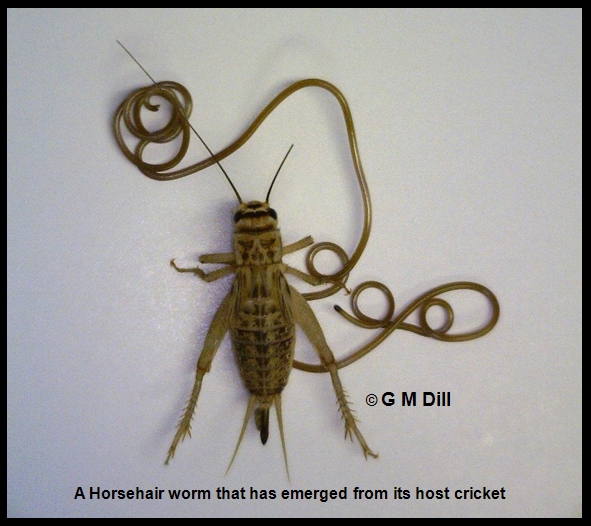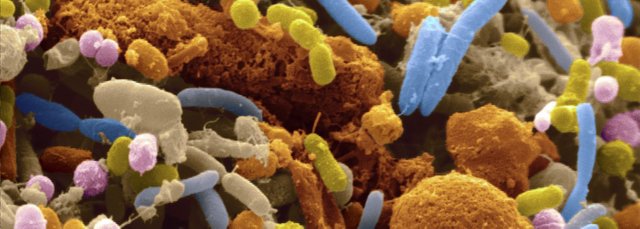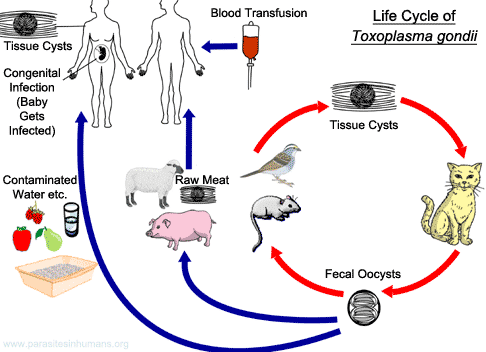
One of the most puzzling things in zoology for me was always, how could microbes manipulate the behavior of animals to promote their own propagation, sometimes even bringing their hosts to commit suicide. I give you a few examples you may not believe but all are true and proven.
The lancet liver fluke manipulates ants to get eaten by sheep
The lifecycle of this parasite is quite complex, snails, ants and sheep being part of it:
An ant (e.g. Formica fusca), uses the trail of snail slime as a source of moisture. By this she swallows a cyst loaded with hundreds of juvenile lancet flukes. The parasites enter the gut and some move eventually to the sub-esophageal ganglion. There, the fluke takes control of the ant's actions by manipulating these nerves. As evening approaches and the air cools, the infected ant is manipulated to move upward to the top of a blade of grass. Once there, it clamps its mandibles onto the top of the blade and stays there until dawn. Afterward, it goes back to its normal activity at the ant colony. If the host ant were to be subjected to the heat of the direct sun, it would die along with the parasite. Night after night, the ant goes back to the top of a blade of grass until a grazing animal comes along and eats the blade, ingesting the ant along with it, thus putting lancet flukes back inside their host.
By this the lifecycle gets completed. Poor ants are victims to other kind of mind control too. Maybe their nervous system is – although very efficient - so simple and thus easy to outsmart.

Horsehair worms cause crickets to jump in water and drown
These malicious nematodes are causing the host (grasshoppers, crickets, mantis and others) to wander into atypical habitats that may contain a water source and causing it to drown by entering the water. Crickets would never ever enter water by themselves, as this results in their death! Once in water, the adult worms then emerge from the host and seek out other adults for sexual reproduction.

It turned out that grasshoppers which contain the parasite express (create) different proteins in their brains compared to uninfected grasshoppers. Some of these proteins have been linked to neurotransmitter activity, others to geotactic activity. Further, it appeared that the parasite produces proteins that act directly on the development of the central nervous system and are similar to proteins known from other insects, suggesting an instance of molecular mimicry.
Gut bacteria are modulating brain development, function and anxiety states
Gut flora consists of microorganisms that live in the digestive tracts of vertebrate and invertebrate animals. The relationship between gut bacteria and its host is largely mutualistic and the microorganisms perform a range of useful functions, e.g. supplying essential nutrients, metabolizing indigestible compounds and defending against colonisation of malign pathogens. Studies using bacteria-free mice demonstrated that gut microbiota significantly decreased anxiety. The bacteria which colonise the gut in the days following birth, during a sensitive period of brain development, seem to be crucial for neural development by, amongst others, stimulating expression of brain-derived neurotrophic factor (BDNF). The common probiotic bacterium Lactobacillus rhamnosus (JB-1), influences gamma-aminobutyric acid (GABA), the main CNS inhibitory neurotransmitter (which in humans is implicated in the pathogenesis of anxiety and depressionis). Together, these findings suggest that certain organisms could one day be used as treatment of stressrelated psychiatric disorders such as anxiety and depression. In addition to manipulating neurotransmitters, some microbes have been shown to influence mating preference in the fruit fly (there is a preference to mate with flies raised on the same food medium – it seems that the gut bacteria themselves are responsible for this preference by regulating the production of sex pheromones). An increasing number of human mental illnesses, such as autism, increased anxiety and depression, have been linked to gut flora. This is a rapidly growing area of research that has just begun.

Toxoplasma gondii makes mice to get eaten by cats
Toxoplasma gondii is an intracellular parasitic protozan that causes the disease toxoplasmosis. It is mostly reproducing in cats, but uses also mice, rats and humans as intermediate hosts.
T. gondii has been shown to alter the behavior of infected rodents (a general reduction in their innate dislike of cats, decreased aversion to cat urine, not shying away from areas where cats live and also being less able to escape should a cat try to prey). By this the parasite increases the rodents' chances of being preyed upon by felids, its definite host. We know that after having infected the rats brains, T. gondii increases the production of the neurotransmitter dopamine, does epigenetic remodeling in neurons which govern the associated behaviors and cause hypomethylation of arginine vasopressin-related genes in the medial amygdala to greatly decrease predator aversion.

So far so good, now the disturbing part starts. It is believed that up to a third of the human population is infected with T. gondii. Worse, similar behavioral changes like in rats were also seen in infected humans: Studies using the Cattell’s 16 Personality Factor questionnaire found that infected men scored lower on Factor G (superego strength/rule consciousness) and higher on Factor L (vigilance) while the opposite pattern was observed for infected women.This means that men were more likely to disregard rule and were more expedient, suspicious and jealous. On the other hand, women were more warm hearted, outgoing, conscientious and moralistic.
Mice infected with T. gondii have a worse motor performance than non-infected mice. Likewise, in computerized reaction tests It was found that the infected adults performed much more poorly and lost their concentration more quickly than the control group. This fits with an observation that Infected subjects have a 2.65 times higher risk of getting into a traffic accident.
A number of studies have suggested that behavioral or personality changes may occur in infected humans, and infection with the parasite has recently been associated with a number of neurological disorders, particularly schizophrenia and bipolar disorder. Another study also found cognitive deficits in adults to be associated with joint infection by both T. gondii and Helicobacter pylori. Also suicide attempters have significantly higher IgG antibody levels to T. gondii than patients without a suicide attempt. Although a causal relationship between latent toxoplasmosis and these neurological phenomena has not yet been firmly established, the “bodies of evidence are piling up”.
Food for thought: Can we rule out that humans are manipulated by parasites in their behavior? Maybe the delusion of (multiple) gender equality and feminism in its radical forms or pathologic self-hate (leading partly to refugee welcome behavior) has a biologic cause? Are some people more susceptibel than others to parasites? I have no better explanation as why some lefties and do-gooders (Gutmenschen in German) are so constantly ignoring simple facts. I don´t really believe in this 100%, but offer it as an alternative explanation. More research needs to be done.
References:
https://en.wikipedia.org/wiki/Dicrocoelium_dendriticum
https://link.springer.com/content/pdf/10.1007%2Fs40362-013-0013-8.pdf
https://en.wikipedia.org/wiki/Toxoplasma_gondii
pics:
http://thenewdaily.com.au/news/world/2015/09/07/pictures-heartwarming-way-germany-welcoming-refugees
https://www.flickr.com/
https://extension.umaine.edu/home-and-garden-ipm/
http://www.organiclifestylemagazine.com/kill-candida-and-balance-the-gut-quickly
http://www.parasitesinhumans.org/toxoplasma-gondii.html
Sources:
https://en.wikipedia.org/wiki/Dicrocoelium_dendriticum
Not indicating that the content you copy/paste is not your original work could be seen as plagiarism.
Some tips to share content and add value:
Repeated plagiarized posts are considered spam. Spam is discouraged by the community, and may result in action from the cheetah bot.
Creative Commons: If you are posting content under a Creative Commons license, please attribute and link according to the specific license. If you are posting content under CC0 or Public Domain please consider noting that at the end of your post.
If you are actually the original author, please do reply to let us know!
Thank You!
More Info: Abuse Guide - 2017.
Downvoting a post can decrease pending rewards and make it less visible. Common reasons:
Submit
Thanks for removing the flag! Quotation was added.
Downvoting a post can decrease pending rewards and make it less visible. Common reasons:
Submit
Interesting topic but I think it is mainly physiology.
I wonder if you can find those three girls and talk with them now
Downvoting a post can decrease pending rewards and make it less visible. Common reasons:
Submit
I have good results destroying pathogens and parasites using a Rife electro-medical machine. I bought it on amazon 5 years ago and it’s from the company rifedigital.com
Downvoting a post can decrease pending rewards and make it less visible. Common reasons:
Submit
Thanks - How does it work? How are the pathogens killed?
Downvoting a post can decrease pending rewards and make it less visible. Common reasons:
Submit
Dr. Rife spent long hours testing each pathogen for its “mortal oscillatory rate”. When bombarding the pathogens with square-headed sound waves (safe for the host unlike chemotherapy), the pathogens shake apart and sometimes explode. A good way to visualize this is when a singer can shatter a wine glass with the correct resonance frequency of the glass. http://rifedigital.com/creation-of-the-beam-ray-machine-in-1938/
Downvoting a post can decrease pending rewards and make it less visible. Common reasons:
Submit
Resteemed to over 5500 followers and 100% upvoted. Thank you for using my service!
Send 0.100 Steem or 0.100 Steem Dollar and the URL in the memo to use the bot.
Read here how the bot from Berlin works.
@resteem.bot
Downvoting a post can decrease pending rewards and make it less visible. Common reasons:
Submit
Dr Dietrich Klinghardt reports of parasites, which collect poisons etc. in their hosts and this way are helpful to their hosts and even allow them to survive the poisoning.
One really has to be careful how to get rid of them. MMS helps, but not if taken orally.
If these parasites die within the host, the full load of poison then is in the host.
Downvoting a post can decrease pending rewards and make it less visible. Common reasons:
Submit